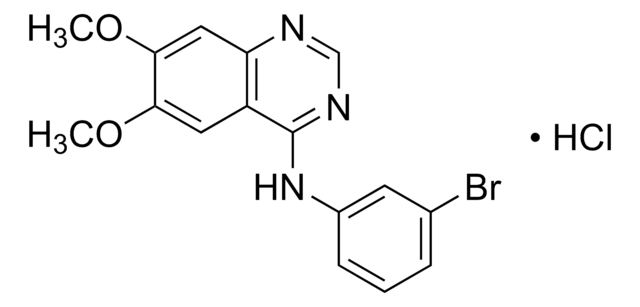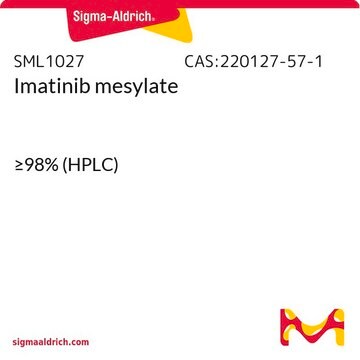SML1657
Gefitinib
≥98% (HPLC), powder, EGFR TK inhibitor
Synonym(e):
N-(3-Chloro-4-fluoro-phenyl)-7-methoxy-6-(3-morpholin-4-ylpropoxy)quinazolin-4-amine, ZD1839
About This Item
Empfohlene Produkte
product name
Gefitinib, ≥98% (HPLC)
Qualitätsniveau
Assay
≥98% (HPLC)
Form
powder
Farbe
white to beige
Löslichkeit
DMSO: 10 mg/mL, clear
Lagertemp.
room temp
SMILES String
COC(C=C(N=CN=C1NC2=CC(Cl)=C(F)C=C2)C1=C3)=C3OCCCN4CCOCC4
InChI
1S/C22H24ClFN4O3/c1-29-20-13-19-16(12-21(20)31-8-2-5-28-6-9-30-10-7-28)22(26-14-25-19)27-15-3-4-18(24)17(23)11-15/h3-4,11-14H,2,5-10H2,1H3,(H,25,26,27)
InChIKey
XGALLCVXEZPNRQ-UHFFFAOYSA-N
Angaben zum Gen
human ... EGFR(1956)
Suchen Sie nach ähnlichen Produkten? Aufrufen Leitfaden zum Produktvergleich
Anwendung
- To study its effective use in endometrial cancer therapy
- Cell proliferation, cell cycle and apoptosis assays
- Cell viability assay and colony formation assay
Biochem./physiol. Wirkung
Gefitinib has a higher affinity for ATP (adenosine triphosphate) binding site in the EGFR tyrosine kinase domain than ATP. Hence, gefitinib is known to inhibit the progression of endometrial cancer.
Signalwort
Danger
Gefahreneinstufungen
Acute Tox. 4 Oral - Aquatic Chronic 1 - Carc. 2 - Eye Dam. 1 - Repr. 1B - Skin Irrit. 2 - STOT RE 2 Oral
Lagerklassenschlüssel
6.1C - Combustible acute toxic Cat.3 / toxic compounds or compounds which causing chronic effects
WGK
WGK 3
Flammpunkt (°F)
Not applicable
Flammpunkt (°C)
Not applicable
Analysenzertifikate (COA)
Suchen Sie nach Analysenzertifikate (COA), indem Sie die Lot-/Chargennummer des Produkts eingeben. Lot- und Chargennummern sind auf dem Produktetikett hinter den Wörtern ‘Lot’ oder ‘Batch’ (Lot oder Charge) zu finden.
Besitzen Sie dieses Produkt bereits?
In der Dokumentenbibliothek finden Sie die Dokumentation zu den Produkten, die Sie kürzlich erworben haben.
Kunden haben sich ebenfalls angesehen
Unser Team von Wissenschaftlern verfügt über Erfahrung in allen Forschungsbereichen einschließlich Life Science, Materialwissenschaften, chemischer Synthese, Chromatographie, Analytik und vielen mehr..
Setzen Sie sich mit dem technischen Dienst in Verbindung.

















